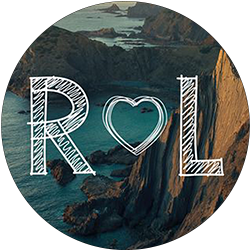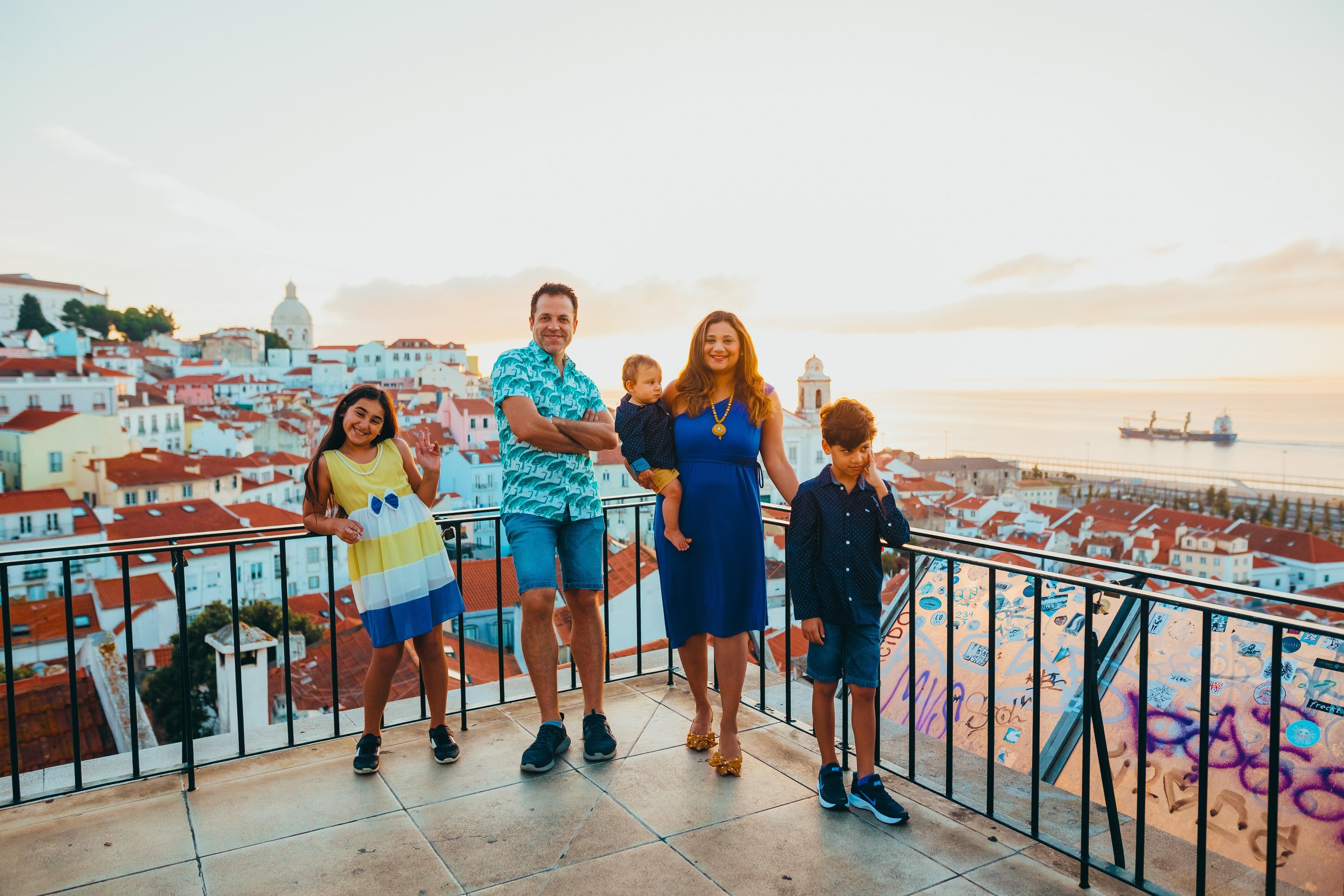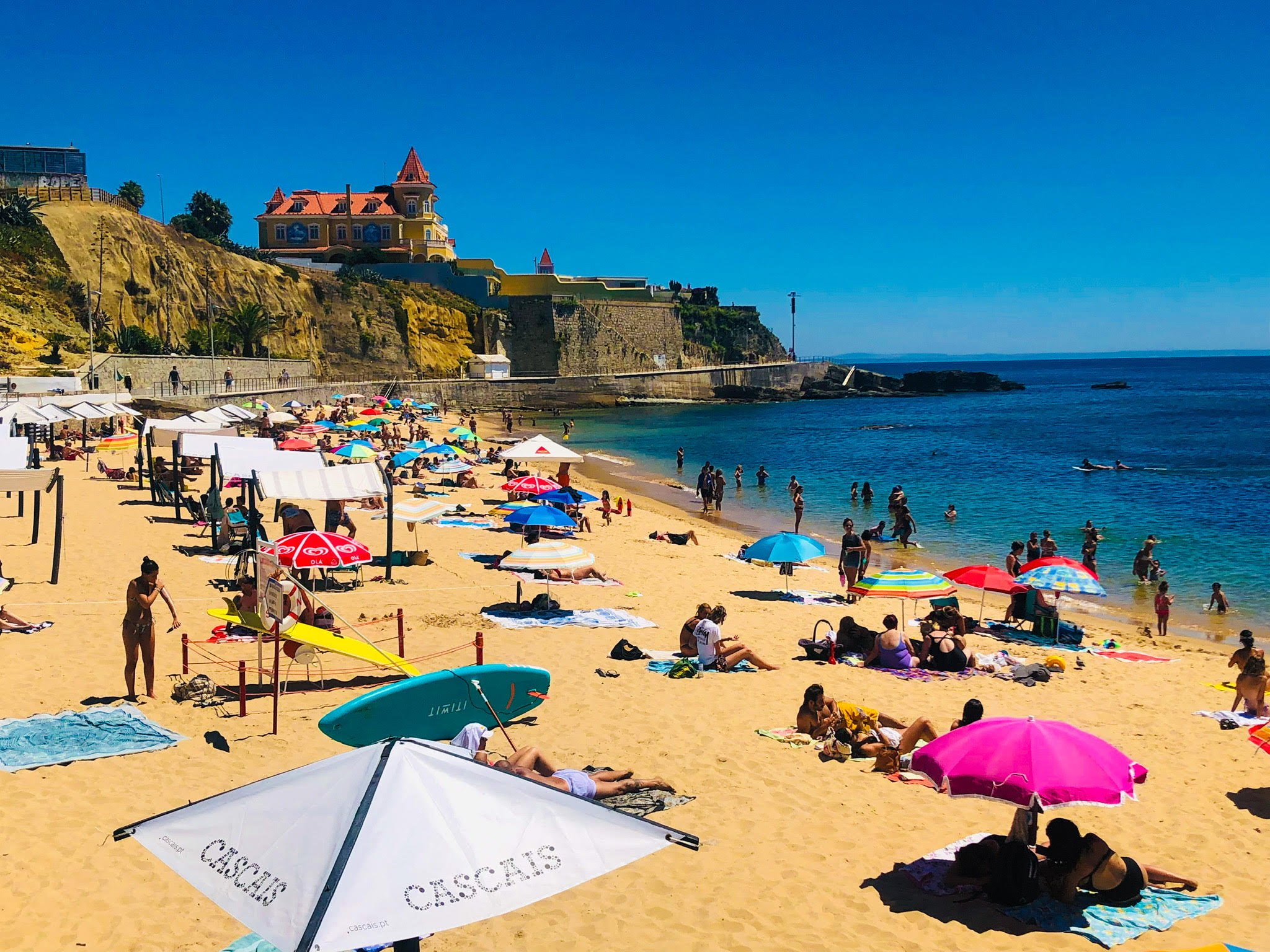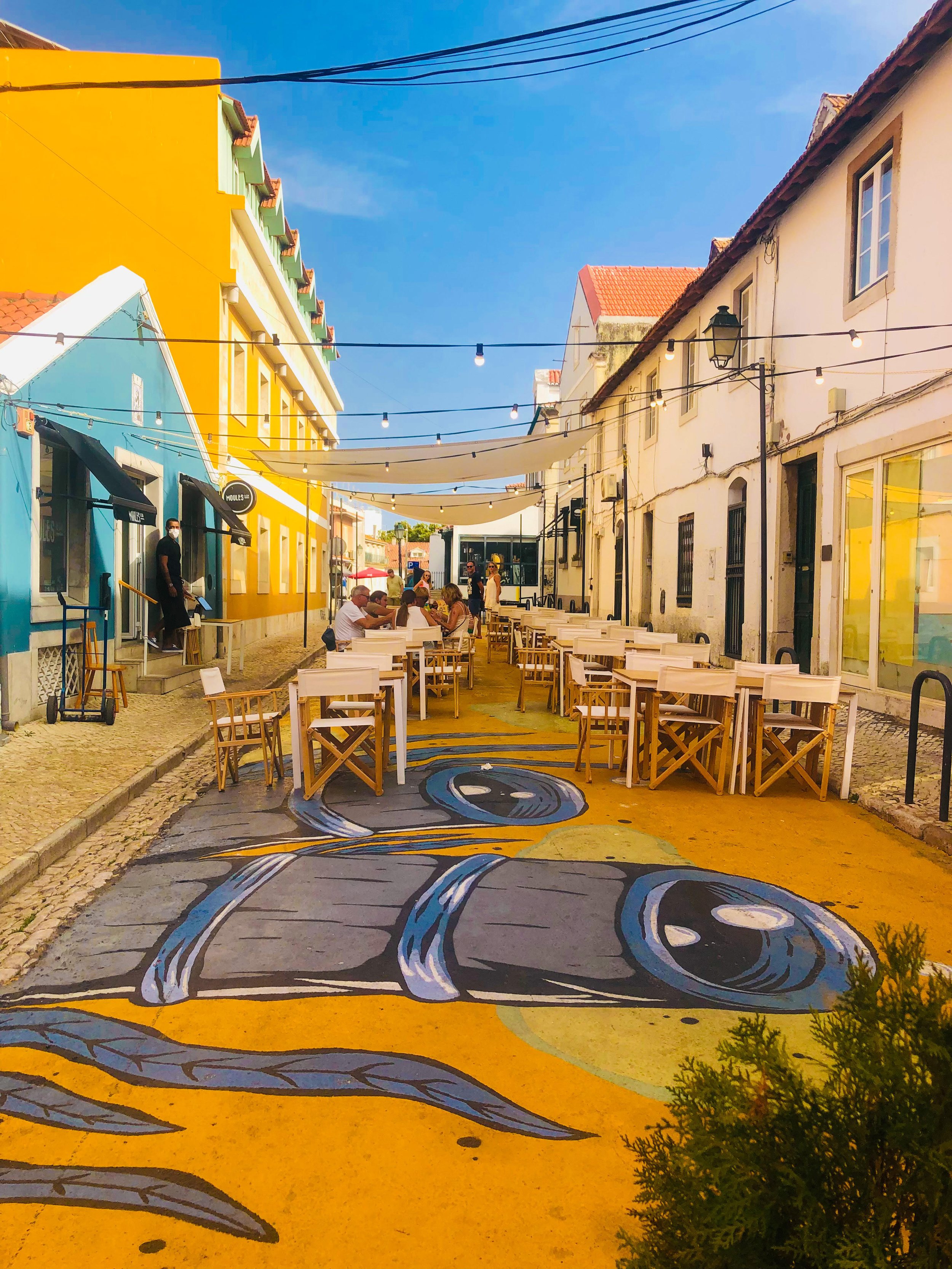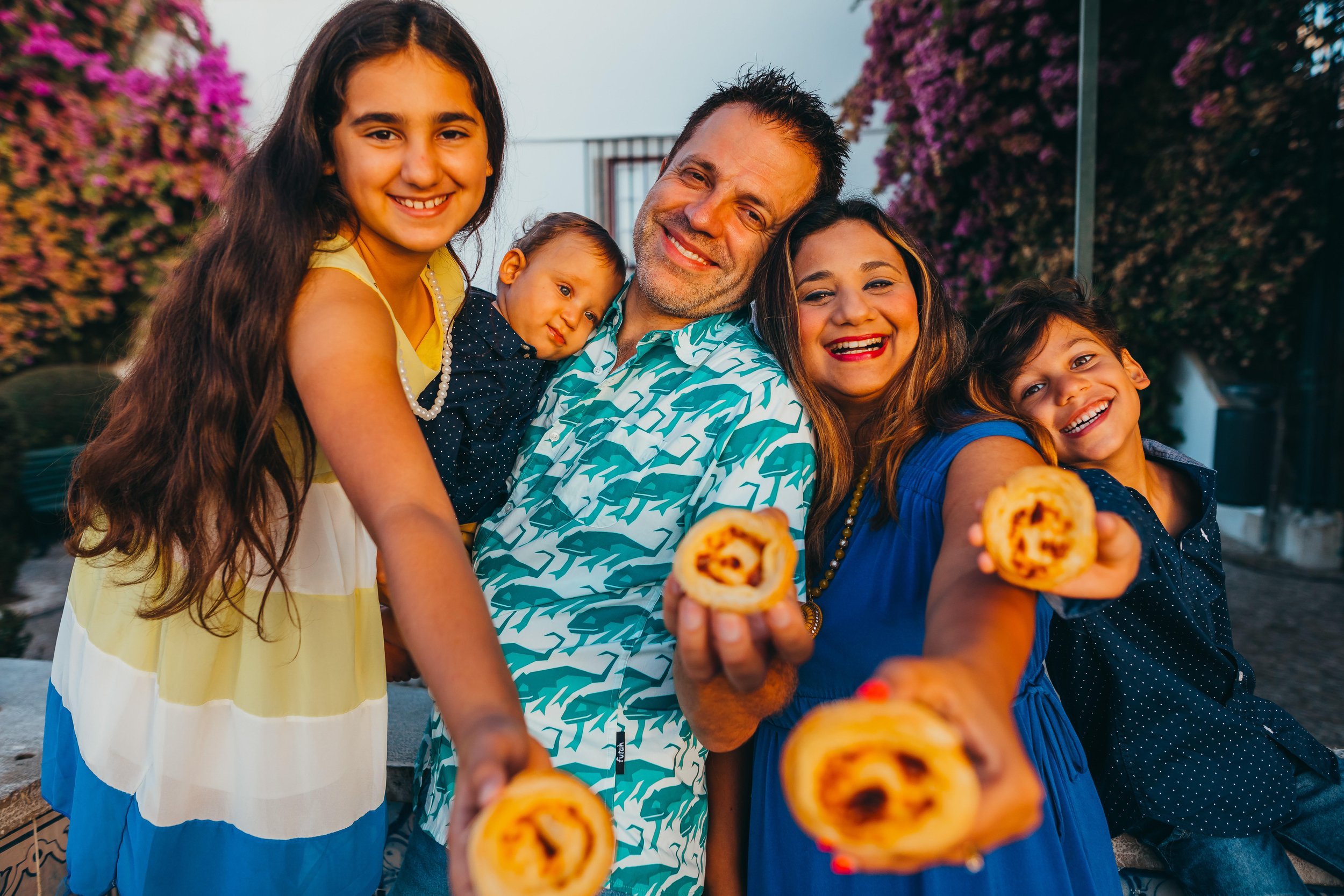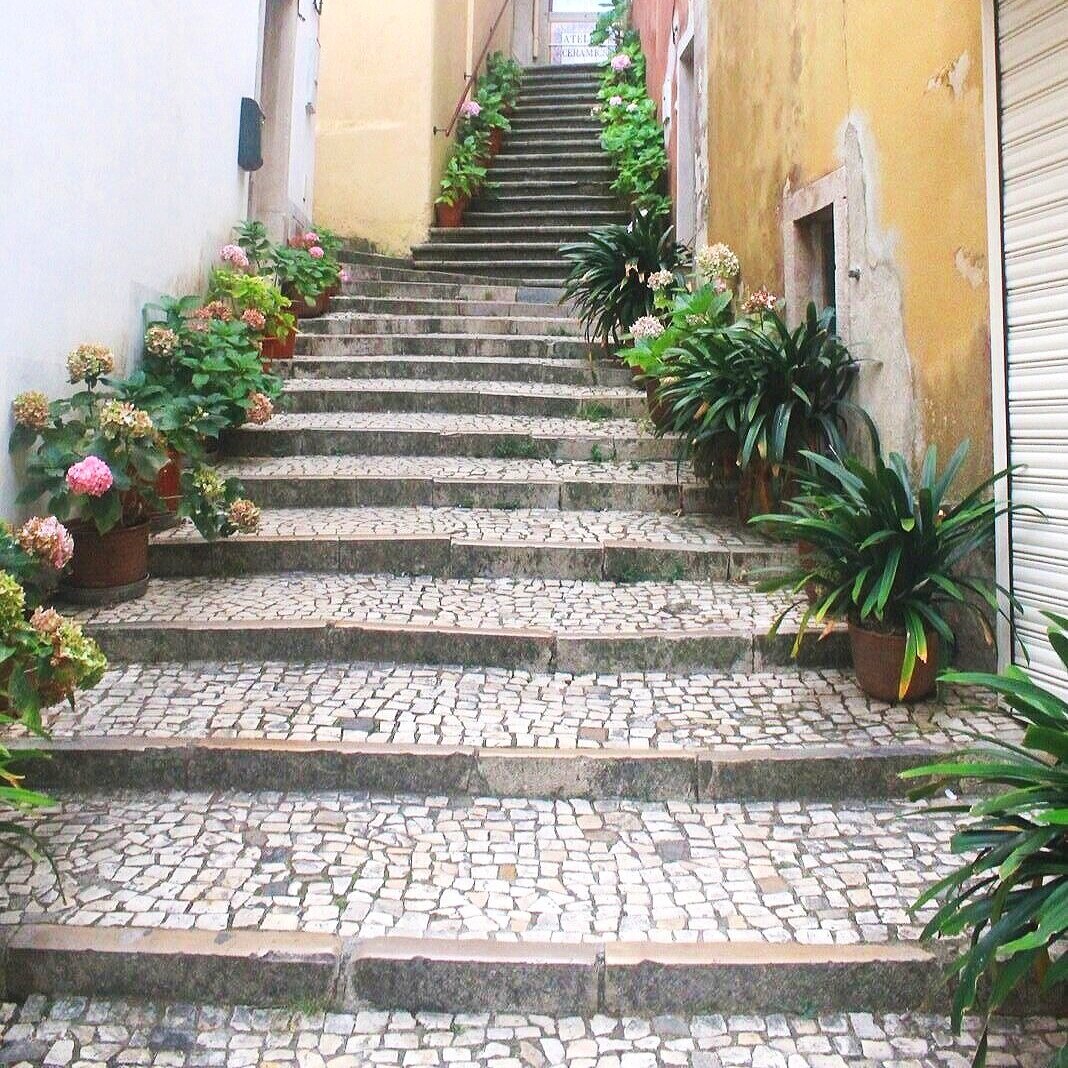Serial Expat and Author of This Messy Mobile Life Shares Her Story
Meet Mariam
Also known as @andthenwemovedto on Instagram and Facebook, she’s no stranger to surfing the waves of an international move.
As a serial expat from childhood, she’s lived in nine countries across four continents and knows a little something about navigating the ups and downs of managing a multicultural, multilingual family.
Keep reading to learn how her new life in Portugal compares to her previous posts abroad.
“As a family we have multiple identities that often jostle for attention. The five of us do not share the same birth country, the same first language, the same childhood memories nor the same view of the world. We are one family, yet all of us are very different.”
Tell us about you and your family
We are a family of five: I’m Mariam, born in Pakistan, raised in Bahrain, the US, and Pakistan. My husband Martino is half German, half Italian, and was born and raised in Germany. We have three kids: our daughter Mina aged nine born in Singapore, our son Mikail aged seven born in Dubai, and our son Miro aged one born in Lisbon.
When we are asked where we are from, we really struggle to know where to start. Do we explain where each of us was born, the countries in which we have grown up, or the country in which we currently live? As a family, we have multiple identities that often jostle for attention. The five of us do not share the same birth country, the same first language, the same childhood memories nor the same view of the world.
We are one family, yet all of us are very different.
Where are you currently living?
We have lived in the Cascais/Estoril area for the past 18 months. We chose Cascais as we fell in love with this idyllic seaside town, with its historic center, medieval castles, sun-kissed beaches, beautiful parks, buzzing waterfront developments, and incredible nature. In the end, we think Cascais is an ideal place for a globally mobile, multicultural, and multilingual family like ours. I particularly love how cosmopolitan Cascais is with a very good mix of locals and expats and lots of great options for schooling for our kids.
What inspired you to pursue expat life?
Well, I was raised abroad myself in my early childhood. My Pakistani parents raised me and my sister in Bahrain and the US, before repatriating as a family to Pakistan. This is why I often joke that I was an expat kid from birth and that moving is in my blood. Being raised as a Third Culture Kid (TCK) myself, I grew up learning how to cross cultures effectively, grew up bilingually from birth speaking both Urdu and English, and learned how to embrace new people, places, and cultures with an open heart and a curious mind.
I definitely wanted a similar life-enriching experience for myself initially and then for my kids. It all started when I decided to live abroad as an adult too, in charge of my own adventure. I left Pakistan at the age of 18, almost 19, with a blue suitcase and a one-way ticket in my hand to Boston’s Logan Airport to attend college in Massachusetts. In my junior year abroad I decided to move to England, which is where I met the man who’s now my husband and together our life has taken us to live in many countries since.
What started off as a solo adventure has now turned into a full-blown adventure with a 40-ft container, an expat husband from another corner of the world, and three kids born in three different countries. We call ourselves serial expats now. Our world is big and growing all the time. Expat life has its challenges and opportunities and we have learned to embrace both! We currently move to new countries due to my husband Martino’s career in international shipping which sees us usually posted to big cities with big ports and shipping terminals. We love raising our children with multiple cultures, languages, nationalities, and identities. I firmly believe the more you show your kids the world, the more they will love the world. Expat life is truly the best way to raise global citizens.
“What started off as a solo adventure has now turned into a full-blown adventure with a 40-ft container, an expat husband from another corner of the world, and three kids born in three different countries.”
How has expat life changed you for the better?
I love living outside of my comfort zone. When you live away from home, you learn so much about yourself—what’s important to you becomes clearer, things you only did or followed because it’s what everyone else did back home, fall away on the side—you become more confident about yourself and your abilities. For instance, I learned which traditions were really important to me, which holidays I would celebrate no matter which corner of the world I lived in and it helped me to create authentic, portable traditions for myself and my family.
I also enjoy seeing the world and experiencing it through a different lens in each different country. I love how a place that meant absolutely nothing to me, suddenly becomes “home.” I have a theory that as expats we never really leave the places we call home, they become a part of us and we take them with us no matter where we go next in the world. I have learned that I can make any corner of the world my home and in return understood that for global nomads, home is not a place you leave behind, but a story you take with you no matter where you go. Each country you live in is a new chapter in your story. This has been a hugely helpful and comforting discovery in my journey of moving and living abroad in nine countries and four continents.
What’s the hardest part about being an expat?
The hardest part about being a serial expat is settling into a new country, making your house a home and meeting a lovely group of friends, and then having to say goodbye to all of it and start again, in a new country. This process tears me up each time, as I get very attached to people and places. I also find dealing with the constant uncertainty that expat life brings (Are we staying? Are we leaving? Where are we moving to next? Will this be the move that breaks my children?) hard to handle on most days. Expat life forces you to live in the present as it is impossible to do any long-term planning. I still struggle with this a lot.
I also find that living far away from your family when there is an emergency or a loved one is sick or dies, is one of the hardest parts of being an expat. While I have been living abroad, I lost three treasured grandparents and it was tough not to be able to say goodbye. Last year, my Italian father-in-law battled a cancer diagnosis in Germany where my parents-in-law reside, and it was tough not to be able to visit as much as we would have liked given the pandemic, travel restrictions, hospital restrictions, and more.
How did you choose Portugal as your current location?
Since we move around the world as corporate employees, usually we don’t choose a location but the location is presented to us as a possible option for our next expat move. We were living in Accra, Ghana in West Africa, when the next locations were discussed for us - the options at the time were either Panama or Portugal. It just happened to be Portugal!
We had visited Lisbon for a lovely weekend getaway when we were living in Copenhagen, Denmark (back in 2010) and had really enjoyed Lisbon. Saying yes to moving to Portugal was a total no-brainer. Great quality of life, a healthy work/life balance, over 300 days of sunshine, a safe and multicultural environment to raise our children, and delicious Mediterranean food were just some of the reasons we said yes right away!
The Yellow Streets of Cascais
What are some interesting things you’ve learned during your time in Portugal?
As a history buff who loves learning the new language of each country I move to, Portugal has been an amazing experience. I started learning Portuguese right away and was amazed to learn that there are over 19,000 words of Arabic origin in the Portuguese language, due to over 500 years of Muslim rule by the Moors in Portugal. From the name of neighborhoods starting with the Arabic prefix of “Al” (“the”) such as Alfama, Alcabideche, Alcoite, Algarve to the beautiful Azulejos tiles that first came to Portugal in the 15th century when parts of the Iberian Peninsula was under Moorish rule, there is still such a visible presence of the Moors—it makes me ponder on how we may continue to shape a place, long after we leave it.
Quite recently, I’ve been engrossed in learning more about a particular group of people in Portugal known as the “retornados” (“The returnees”) who were generations of Portuguese people settled in its African colonies such as Angola and Mozambique, who “returned” to the Motherland at the time of the dictatorship in Portugal and the divesting of its colonies which coincided with their independence. Many of these people had never lived in Portugal before, had grown up in different countries in Africa, and faced the huge loss of identity and belonging upon their “return.” In many ways, this spoke to me as an expat, of the losses we experience when we leave behind a beloved country (tangible losses such as those of our friends or neighbors but also intangible losses such as those of hearing a particular language around us every day). The theme of moving and returning to a place where we are not understood is a global language and it’s interesting to explore these in a Portuguese context as well.
It’s no wonder that the Portuguese language also includes one of my favorite words that captures expat life so well: the concept of “saudade”; a melancholy yearning for that which is lost or can never be again. This resonates deeply with me as a global nomad.
What have been some of the biggest challenges you’ve faced while living in Portugal?
To be honest, if I compare Portugal to some of the other countries I’ve lived in, I think Portugal is a really easy country to move to and to adapt to. The weather in Lisbon and Cascais is pretty temperate, unlike the severe heat we were used to in Dubai when summertime temperatures would soar to above 40 degrees celsius or the incredible humidity in Singapore which left you needing three showers a day. Unlike in Ghana, there is thankfully no risk of malaria in Portugal and we can appreciate small things like drinking water straight out of the tap. Yes, Portuguese bureaucracy can require you to have some patience, but I think Italian bureaucracy requires you to have nerves of steel :-) Portuguese is a difficult language to learn, partly due to how fast people speak it and how much the words are slurred (add in a global pandemic and people speaking behind a mask and I truly do struggle sometimes to understand!) but even though I make a million mistakes while speaking it, the Portuguese people always encourage me and appreciate my efforts at speaking it—unlike in Germany where I was always corrected or language-shamed for not speaking completely correct German in the beginning. So the relaxed and friendly attitude in Portugal is more conducive to language learning. I have a great Portuguese tutor who I really appreciate for teaching me not just the language but the social cues and etiquette as well. She also teaches me all the cool Lisbon slang :-)
So my biggest challenge in Portugal was ironically right in the beginning: I was pregnant with our third baby when we moved from Ghana to Portugal in July 2020. I had only been in Portugal for four days and was busy getting my NIF number and opening up a bank account when suddenly I faced a huge medical emergency as I went into preterm labor at just 26 weeks. It was an incredibly stressful start to our life in Portugal! Part of it was due to the global circumstances: a raging pandemic, no vaccines rolled out at that time, very strict rules at public hospitals which meant I was unfortunately hospitalized for 5 weeks alone without my husband or kids able to see me, and an old-fashioned approach to pregnancy and childbirth in the public health system (only laboring on your back, limited pain relief available for instance no gas-only epidural, etc.) which meant I ultimately gave birth to our third child in Lisbon—alone. My husband was not allowed in even with a negative Covid test at the time.
It was a very stressful and challenging time, trying to advocate for myself and my baby who spent 5 weeks in the NICU at birth, in a foreign medical culture and country to which I had just moved. There were good parts as well; I received good medical care, thanks to which my premature baby born at 30 weeks continued to do well and is thriving even today. I had amazing care from some of the nurses and one doctor held my hand as I broke down on the operating table. Just to clarify: I was scheduled to give birth at one of the private hospitals in Lisbon, but due to the emergency situation of going into preterm labor, I was sent immediately to a public hospital which in Portugal are better equipped to handle a premature birth and delivery. I believe Portugal has a really good medical and healthcare system and that further improvement can be made for pregnant mothers by focusing on their mental and emotional wellbeing in addition to their physical care. Since having my third baby here, I have had a great neonatologist pediatrician for our premature baby whose care has been amazing.
What has been the most rewarding thing about living in Portugal?
Oh, there are so many things! But I truly enjoy the very healthy work/life balance in Portugal. In many ways, it's similar to life in Denmark which I also enjoyed for this very reason. Unlike in the US, where people live to work, here in Portugal people take time off to be with their families, to travel, and to switch off from work. It is common to see notices on restaurants and cafes in Cascais and Estoril in the summer month of August stating “We are closed for a summer break”. I grew up in New York, went to college in Massachusetts, and started my first job in investment banking in Houston, Texas. I remember only having two weeks off per year and that it was actually frowned upon if I took those two weeks off to visit my family in Pakistan or travel! For this reason, living in Portugal and especially raising a family in Portugal is an experience I’m enjoying a lot. The reminder to slow down and enjoy life, to sit down and enjoy a warm bica, to pursue interests outside of work—this is healthy living and one of the most rewarding aspects of living in Portugal.
I’m also enjoying watching my children learn Portuguese as a new language. Our kids are raised with our four native languages: German, Urdu, English, and Italian. Being a multilingual family, we always prioritize our home languages. But since our expat kids have been raised in Singapore, Dubai, Accra and now in Lisbon/Cascais, they have also been exposed to and have learned Mandarin, Arabic, French and Portuguese in school. For them, learning a new language is the normal thing you do when you move countries!
P.S my kids also think it’s normal to speak one language with your mom and a different language with your dad ;-)
What do you know now that you wish you’d known before moving to Portugal?
I think before moving to Portugal, it is really important to understand the local conditions, the average salaries, the minimum wage, the average rents, and the historical reasons behind it to get a better grasp of some of the local issues and challenges here. As an economist, I was surprised to discover for instance how low the minimum wage is in Portugal (about 700€ per month) especially when I see how much a one-bedroom or two-bedroom apartment in Lisbon rents for—usually double the amount.
The reason it is important to understand and research the local conditions is that as an expat, it helps you to be mindful and conscious of not exacerbating the problems that already exist and to ensure that you acknowledge quite often your privilege of moving here with a foreign income which allows you to afford a lower cost of living perhaps.
The rise of remote work will only increase the trend of people from wealthier nations relocating to desirable locations like Portugal. But there is an impact on the local population as the cost of rentals rises to meet the demands of those competing in another currency and often the locals are priced out of their own neighborhoods. As an expat or anyone moving to Portugal, I encourage you to move here because you can have beautiful experiences living here, but of course, the land, the people, the culture, and the history deserve respect. Expat life is a beautiful thing—the exchange of ideas, the mix of different cultures and different perspectives brings good and positive things to all, so my advice is to greet expat life with an open heart and be truly mindful of your own privilege (whether economic or otherwise) in relocating here.
Is there anything else people should know who are thinking of moving to Portugal?
Well, it really depends where you are moving from. I often see expat groups on Facebook and other places complain they can’t find a certain ingredient here or are missing something from back home. Part of that is human nature: to miss what you are used to. But to be brutally honest, if you spend your time in Portugal complaining that your favorite brand of shampoo is not available here, then you have missed the memo on expat life to appreciate a new country for what it is and to not move to a new place, expecting it to be similar to what you know. So move to Portugal with the right mindset and attitude—expect things to be different here.
On a practical level, I think if you’re interested in moving to Portugal, start connecting with those who live here and have made a similar move. In fact, I think that’s how I connected with Allison! Find bloggers, writers, expats, and parents who have moved to Portugal with their kids and find out as much as you can through them. Reading blogs and books on making an international move and how to help yourself and your family transition is also part of your homework.
Keep in mind, bureaucracy in Portugal can take time, so plan accordingly and adjust your expectations accordingly. For example, I moved to Portugal with an expired American driver’s license, a valid driver’s license from Dubai in the UAE, on an Italian passport. The lady looking at my case didn’t know what to do initially since my EU passport did not correspond to my non-EU driver’s license and I got told three different things! Ultimately I was told I can exchange my UAE driver’s license for a Portuguese one, but due to Covid times, it took six months to get my appointment to do so. I am just grateful I didn’t have to give a driving test again, which I had to do in Dubai back in 2014.
What is the coolest or craziest thing you’ve seen or that has happened to you since moving to Portugal?
I saw the President of Portugal going for his morning walk in Cascais! This was during lockdown last year, he was appropriately masked, so at first, I didn't know who it was until I saw people taking photos of him and then recognized him myself. He said “Bom Dia” (good morning) to those passing by, very cool, very informal—just another Tuesday in Cascais.
Cascais, Portugal
Tell us some of your favorite things in Portugal
Beach
Praia do Poça
A small, popular sandy beach located in São João do Estoril.
Dish
Clams à bulhão pato
A deliciously simple recipe of steamed clams, and a dressing of garlic, olive oil, coriander, lemon, and white wine.
Must-See
Rua Amarela (Yellow Street)
A great spot of outdoor dining in Cascais with restaurants and tables spilling out into the street.
Restaurant
Furnas do Guincho
It has the best seafood in town and spectacular views over the Atlantic Ocean.
Mariam is the author of This Messy Mobile Life, a fantastic read about what it takes to live a multicultural, multilingual, globally mobile life.
The book acts as a guidebook for globally mobile families who choose to live abroad and bring up their children abroad in a new culture, country, and language. She shares stories, tips, tools, and resources on managing an international relocation, raising bilingual children, how culture, language, and identity overlap as our sense of home and belonging expands and changes when we move to a new country.
Interested in Moving to Portugal?
Renovating Life contains affiliate links. If you make a purchase through these links, we will earn a commission at no extra cost to you. As an Amazon Associate, we earn from qualifying purchases. Links like this allow us to continue providing top-quality content at no cost to you.
